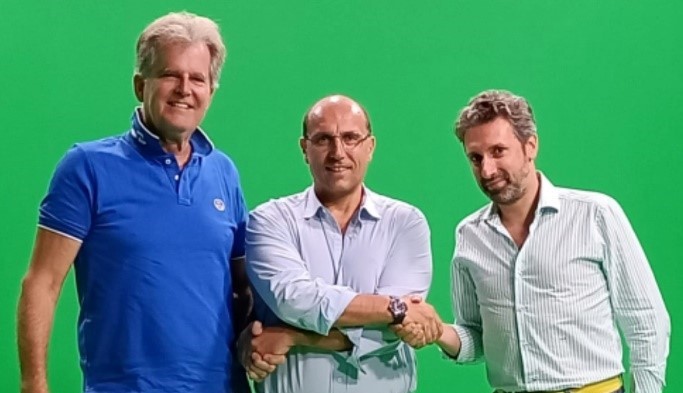Nalucoat is born in the Ceramic District, the “green” startup that eliminates chromium


Da sinistra Michael Robinson, Gian Luca Falleti, Ivan Bonvini
Spinoff of Nanoprom Chemicals srl and Leba 1974 srl, it was founded as a benefit company with the aim of providing an alternative to one of the most polluting industrial processes.
Sassuolo (Modena), 20th November 2022 A new company is born in the heart of the Ceramic District destined to carry forward an unprecedented project as regardsthe elimination of chrome from surface finishing treatments.
It's aboutNalucoat,decidedly green-oriented startup, which will have two offices: in Sant'Antonio di Casalgrande, in the Reggio area, and in San Genesio ed Uniti, in the Pavia area, for a transversality that denotes the inclusive aspect of the project and establishes a sort of joint venture between two of the most industrialized regions of Italy, which alone represent 35% of the national GDP.
The creators of this unprecedented initiative are two young entrepreneurs:Gian Luca Falleti from Sassuolo,patron of the company Nanoprom Chemicals srland for years a supplier of "ultralight" paints for various sectors (top Formula 1 teams, nautical groups and aerospace companies) andIvan Bonvini, founder of Leba 1974 srl from Pavia,specialized in aluminum finishing treatments. At their side thecar designer statunitenseMichael Robinson, from whose pen were born cars such as the Lancia Thesis and Ypsilon, the Fiat Bravo and Brava and the Frecciarossa 1000 train and the front part of the new tonale but famous above all for its propensity to adoptinnovations concerning the future of the automobile.
“La nostra idea di dare vita a Nalucoat società benefit – spiegano Falleti e Bonvini – nasce innanzitutto da un film. Entrambi abbiamo visto, e ne siamo stati fortemente impressionati, il film <<Erin Brockvich – Forte come la verità>>”, uscito nel 2000 e interpretato, tra gli altri, da Julia Roberts. Basato su una storia vera, la pellicola tratta della causa intentata contro la Pacific Gas & Electric per la contaminazione con cromo esavalente di una città californiana. Grazie a questa azione legale, il colosso statunitense dell’energia fu condannato a pagare il più grande risarcimento nella storia degli Stati Uniti: 333 milioni di dollari a più di 600 persone.In fact, hexavalent chromium is one of the most dangerous environmental contaminants.However, it is still used in various industrial processes, despite its use being granted in derogation from international standards and for limited periods. Now, however, there is the solution to eliminate chromium from various manufacturing processes.
Falleti and Bonvini continue: “What allows you to eliminate the chrome plating from aluminum processing is called Nalucoat,the same name we gave to our statrup, a spinoff of our companies Nanoprom and Leba 1974. It is a process based on the product Polysil, a silicon-based coating (a real cold vitrification) whose composition is covered by a patent Nanoprom. In other words, we are facing a real Copernican revolution in various industrial sectors, first of all the automotive sector".
Robinson adds: “Let's think about how many elements of any car currently undergo the shiny or matte chrome plating process. Well,thanks to this treatment, which has already entered the production phase,it will finally be possible to completely eliminate the presence of chromium, an element that is very much in the spotlight today at an international level, precisely because of its impact on the environment”.
Double the benefitwhich can result from the use of Nalucoat. Falleti and Bonvini highlight once again: “The process conceived and patented is doubly green: thanks to the formula of our coating, in fact, it is possibleboth eliminating the use of chrome and recycling the material on which it is applied.Until now, in fact, the aluminum on which the chrome plating is applied cannot be subsequently recycled, but must be reprocessed or disposed of. We are therefore proposing a substantial step forward also from a circular economy perspective".
Another plus of Nalucoat,finally, it is that process waste is considerably reduced. “Current chrome plating – conclude Falleti and Bonvini – produce a processing waste that can even reach 30%. Our treatment, on the other hand, has been designed and optimized to arrive at a waste of no more than 2% physiological, thus guaranteeing a considerable economic advantage to all producers of aluminum components. Lastly, an application that significantly reduces the need for electricity and water and eliminates waste".

[Source: www.rmcmotori.com]
